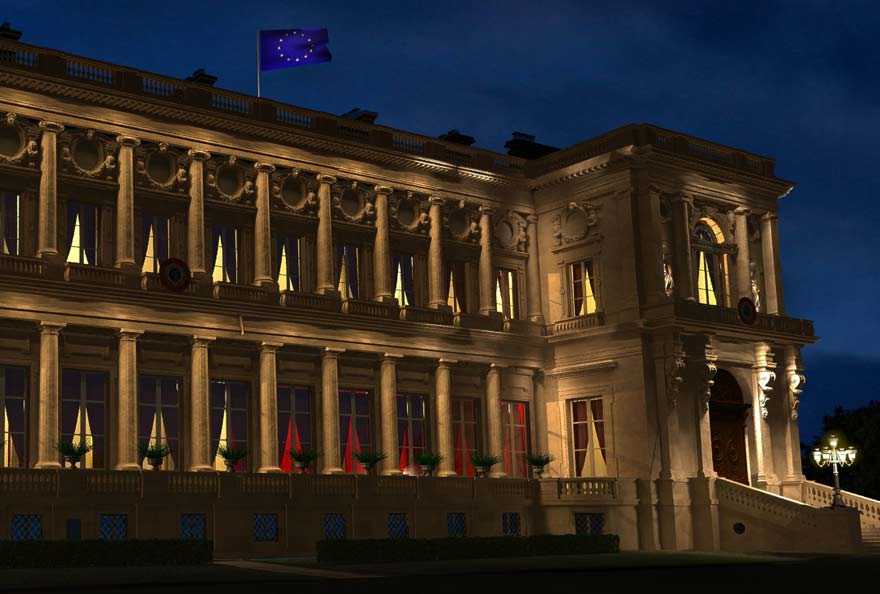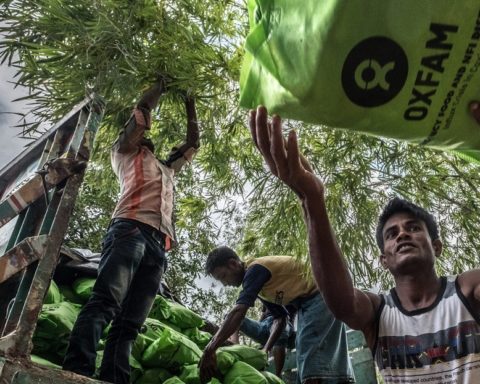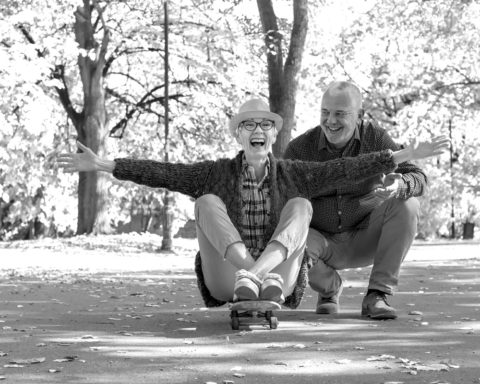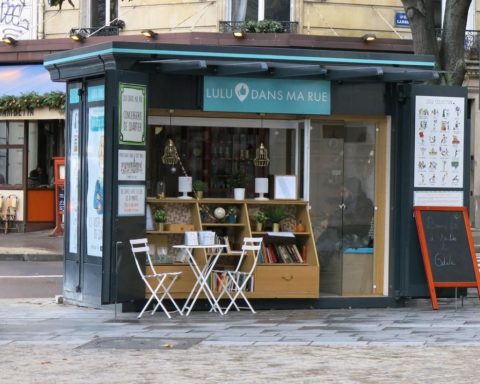"The rising tide lifts all boats; no more poverty if you have a boat."
Lawrence Ferlinghetti
One-way assistance has never allowed the underprivileged to build the destiny of their wishes.
"You want the poor rescued, I want poverty abolished," was the indignation of the author of Les Misérables at the time. It was only after the Liberation that the public authorities put this vow on their agenda, with the institution of a welfare state, respecting the dynamics of solidarity. The re-foundation of this social model is now being considered, in particular because of its shortcomings with regard to the expectations of our Society. The latter concern, for example, the quality of our "living together", or the co-decision processes in local and territorial management. The following lines question some promising initiatives in these areas.
Photo: Sculpture "The Illuminated Crowd " by Raymond Masson -1986 - McGill Avenue in Montreal (Canada)
The 65 characters of the sculpture form a tight society with its couples, its young, its old, its laughter, its fears,...
L’innovative spirit of the welfare state
The social situation of this century, in terms of the issues at stake, is not unlike the one we experienced in the aftermath of the Second World War. Economic development and social protection" were then the key words of the reconstruction effort that led to the advent of a welfare state in our country, which had a twofold mission: "Economic development and social protection":
- Reduce income inequalities between the haves and the have-nots through an equitable redistribution of the nation's wealth,
- To protect our population against the hazards of life, by making the spirit of solidarity the founding principle of the law of our Social Security, whose 70th anniversary we are celebrating this year.
For Professor Alain Supiot, holder of the chair "Social State and Globalization. Analyse juridique des solidarités" at the Collège de France, this novation is motivated by the fact that "it is not poverty that creates a right to be rescued but participation in a system of solidarity in which everyone can be in turn a creditor and a debtor in proportion to his or her needs and resources. This is what makes solidarity an instrument of the equal dignity of human beings" (1)..
The positive effects of our social model are well established. It mobilizes 32 % of the national GDP and employs, with the support of a large number of volunteers, more than one million salaried employees, divided into fourteen specialties for which state diplomas are awarded. Three-quarters of their employers are Associations under the 1901 law, financed by the State to the tune of two-thirds of their budgets.
The expectations of the public authorities with regard to these social workers are twofold, as André Ramoff, Director of Social Action at the Ministry in charge of social work, points out: "Social work is not just about closing gaps in emergency situations. Its main mission is to listen to individuals, to go to the forefront of their real needs in their living environment, in order to improve the analytical and communication skills necessary for the full development of people". (2).
This is the tradition among social work professionals, despite the frequent lack of resources available to them to meet the needs encountered. Added to this, observes sociologist and politician Michel Chauvière, "a strong ethic of involvement. This practice is in fact practised with bare hands, with the sole support of the spoken word. Except in special cases, the social worker creates no employment, no housing, no income. The support that he sometimes gives to active users is not contractual but rather educational". (3)

Social, a new "market"?
For the past twenty years or so, social actors have been anxiously observing that the State has been engaged in a policy of deconstruction, tending to replace its role of protector with that of conditional support, according to a system of competitive bidding between the associative sector and the commercial sector. This amounts to confusing the social sector with the economic sector. Whereas the vocation of the former is of a relational nature, its activity is supported by volunteering and its primary reason is to keep alive the spirit of fraternity in our societies and not that of profitability.
Should we see in this drift "...the end of the epic of generosity begun at the Liberation?" asks Michel Chauvière. And to dread "that these cumulative processes come to sign the end of Social as work, as institution and as collective ethics." (4)
Without sharing this pessimism, some prescribers in this field would be in favour of a reform of our social protection system, which they consider to have become "inefficient, costly and illegible". (5). It is therefore becoming increasingly necessary, in their view, to adapt it to the new requirements of a labour market that is also suffering from mass unemployment. This phenomenon has become, together with the growth in inequality, the main concern of our fellow citizens.
For its part, a report drawn up by Cepremap, (Centre for Economic Research and its Applications, under the supervision of the Ministry of Research), was presented to the French government. (6) confirms this diagnosis but on the basis of a different approach. He attributes what he calls "the self-destruction of our social model" to the mistrust of the French among themselves, as well as towards all their institutions. He holds responsible for this situation "the excess of corporatism and statism inscribed in the logic of our welfare state, which is harmful to the establishment of a true social dialogue in our country". Hence his recommendation to "strengthen intermediary associations, which are essential for maintaining mutual trust in our country. To activate the latter, the state must stop regulating everything and transfer fields of competence to civil society." (7)

The new Social roadmap
At this turning point in its history, where the lasting rebuilding of an institution is only possible in a democratic way, the cause of Social is increasingly calling for the citizen's initiative. This is in line with the wishes of these French people who, at 57 %, speak out in favour of "the citizens themselves", when asked who they trust to improve their daily lives. They then vote for NGOs and associations, while the Government and the Trade Unions each get only 27 % of their votes.
But according to Françoise Fressoz, a journalist at Le Monde, the majority of our population does not believe in the possibility of taking their destiny into their own hands. Let's listen to her: "The intervention of the welfare state is felt by our compatriots as a kind of social mattress, which saves them from overly trying austerity measures. But this situation disappoints their expectations, when they have to make do with the gossip of the media on the subjects that preoccupy them. Of course, the associative life offers them multiple opportunities to act, but its segmented fabric weakens the position of Civil Society in the public debate. And everyone to stay in their own corner, in a dull resignation." (8)
On the other hand, this form of demobilisation appears to be in the minority among the younger generation, for whom digital technology allows "to reappropriate politics through small daily acts... Trade unions, lobbies and traditional parties can be bypassed by actions initiated online. (9).
This same digital technology also encourages citizen expression in a number of local and even regional bodies where its contribution is appreciated. These practices lead their actors to go beyond the field of politics. strictly speakingThis is the first challenge of any territorial policy. And this is how metropolises and deshumanised areas can be transformed, through participatory co-management, into places of citizenship, almost everywhere in France and Europe.
An exemplary initiative of territorial co-management
The testimony below retraces the action led, since 2002, by Dominique Royoux, geographer, associate professor at the University of Poitiers and Director of the Territorial Cooperation Department of this city. In this latter capacity, he is responsible for leading the work of the Grand Poitiers Development Council, which brings together 150 members representing the associations and professionals based in this conurbation, along with its territorial managers.
Co-authored with ten academics in the social sciences and humanities, an account of this experience. (10)Dominique Royoux was kind enough to comment on the highlights. Let's listen to him: "The decentralization laws of the 1980s of the last century were applied locally in the regalian one-way mode. Instead of being concerted with the citizens, public action has resulted in projects being offered by elected officials alone. This excluded from the debate the population interested in the good organization of their daily life. »

Dominique Royoux
This explains why urban space too often constitutes, for its inhabitants, only a geographical entity poorly adapted to their daily needs and devoid of conviviality.
As soon as he took office, Dominique Royoux therefore began a process of collective appropriation for them which enabled the Grand Poitiers constituency to be included in the four constituent dimensions of a fully-fledged Territory."The first of these dimensions is one of identity." he says; "it depends on its social composition; the second dimension is historical and long term; the third is political, according to its electoral boundaries and traditions. The fourth of these dimensions is of a symbolic nature and is a powerful factor of social mobilization".
In doing so, it found that many citizens were willing to give their opinion to elected representatives on public decisions of local interest, for example on the organisation of timetables for services and public transport. This led Dominique Royoux to chair, at the national level, a "Time Office" connected to the European network "Tempo territorial" and bringing together some thirty French cities, on the basis of collaborative consultation.
Thus, in support of territorial co-management, a "temporal ecology" approach is taking shape, which does not simply aim to organise time in order to make it profitable, but to "manage" it qualitatively, in accordance with the daily rhythms and spatial constraints of each person. (11).
Extended Mediation and its promises
It is known that, at its origin, Mediation was given the mission by Civil Society, its cradle, to calm conflicts in different environments (in particular family, school, penal...) thanks to the intervention of a neutral and independent third party, the mediator. Since the 1990s, it has been successful in a growing number of areas and situations.
Now the example of Poitiers illustrates, at the initiative of Dominique Royoux and under the label of "Extended Mediation", an evolving trend which, while respecting the same ethics, differs from that observed in its traditional process. Extended Mediation invites its participants to take on the role of accompanying or facilitating communities. Their role is to enable working communities to maintain within them the climate of good understanding necessary for the pursuit of their objectives.
"In the Mediation thus enlarged", says Dominique Royoux, "The word goes both ways and the governed are invited to report their skills as users to their guardians. The task of reflecting on the way an organisation functions is then incumbent on all its actors, who do not become mediators but contribute to the observance of the spirit of mediation in their organisation".
This type of experience confirms the intuition of the School of "Humanist Mediation", according to which, as Professor Etienne Le Roy develops it during a colloquium (12), "the spirit of mediation is less to make a conflict disappear than to take charge of the future of a collective with more or less drawn borders, when this future passes through new ambitions to give to its members... the mediator then effectively becomes a facilitator of new life. "
It should be noted that in most of our universities, these professional concerns are the subject of courses offering future managers in social management a multidisciplinary training in human sciences, at Master's level. The different forms of Mediation play a significant role in this, where the importance of the "human factor" is recognised as it deserves. This is the case, in particular, at IFOMENE (Training Institute for Mediation and Negotiation) whose Director, Stephen Bensimon, philosopher, considers that the ongoing diversification of Mediation practices, which he himself practises as a consultant, is a positive sign for his future and that of social citizenship.
Conquering new goals
"Solidarity always rises from the ashes. “
A. Supiot
For those who look at it from the right angle, the social epic today pursues two objectives, the first of which, that of solidarity, has given the population better living conditions, even the possibility of surviving in a hostile environment. An in-depth analysis of its advances, by Professor Supiot, shows that they are irreversible, although they are still too slow to bear full fruit. (13).
The second of these objectives is to eradicate the warmongering from which our societies suffer in order to make them adopt the culture of peace, which would open up new horizons for solidarity. For a long time, this objective has interested only an elite of innovators, hopefuls, human rights activists and other peacemakers. But those times are over since the World Social Forums gave a global audience to these pioneers, demonstrating that Humanity was indeed waiting for something more than the maintenance of the old social contract. Debates on the form to be given to this "something else" are widely open in many countries.
Questioned on this subject by Annne-Sophie Novel, journalist Laure Belot considers that"that today we are living in a period of change in the era of uncertainty. Society is divided into two types of actors: those who succeed in identifying emerging societal phenomena, weak signals and others. The important thing at the moment is to observe and learn' (14 ).
Some media seem to encourage this state of mind, as the following anecdote testifies: when asked on the radio about what had changed in his art since his beginnings, a songwriter replied, "I see only one change in my field. Now, in the song, we no longer say I but we say WE a lot more often. I'd say it's becoming societal."

NOTES
(1) Alain Supiot, afterword to Bossuet's De l'éminente dignité des pauvres, Fayard, 2015, p.60.
(2) André Ramoff, Les professions sociales, développement et avenir, Revue La Vie sociale, 1976, number 5, p.267.
(3) Michel Chauvière, Le travail social sur la sellette," revue Projet dossier Social : réparer ou reconstruire, June 2015 p.28.
(4) ibidem p.30
(5 ) Denis Clerc, Protection sociale, au delà du cout, ibidem p. 15.
( 6) Yves Algan and Pierre Cahuc, La Société de défiance, comment le modèle social français s'autodétruit, éditions rue d'Ulm 2006. p. 97.
(7) ibidem
(8) ) Les Matins de France Culture , 1 June 2015.
(9) ) Laure Belot, Nous vivons une période de basculement" Le Un, 18/2/2015 .
(10) Dominique Royoux, Director, La Médiation, un enjeu démocratique, Editions la Librairie des Territoires, 32120 Sarrant, 2013.
(11) Changer de rythme, issue coordinated by T. Paquot, Esprit magazine, December 2014.
(12) Face au conflit, les ressources anthropologiques, sociologiques et théologiques de la mediation, under the direction of E.Iula and J. Morineau, colloquium of the Centre Sèvres, Médiasevres 2112.
(13) Alain Supiot, Au fondement de la citoyenneté sociale, ni assurance, ni charité, la solidarité, Le Monde Diplomatique, November 2014, p.3.
(14 ) Laure Belot op.cit.












